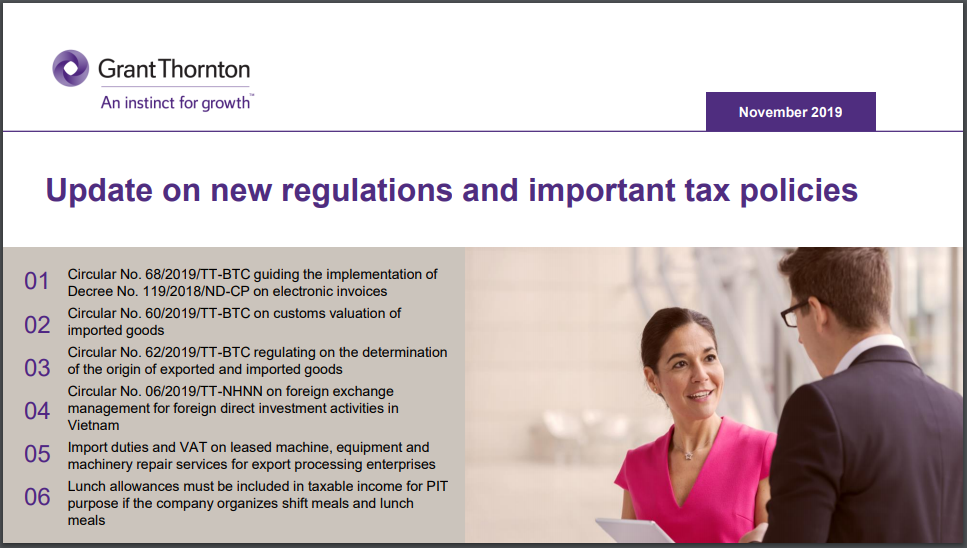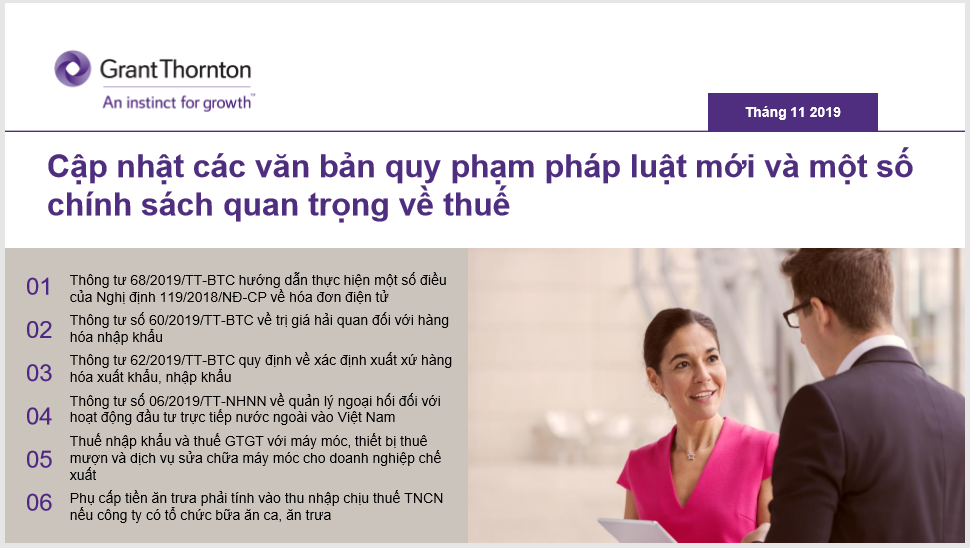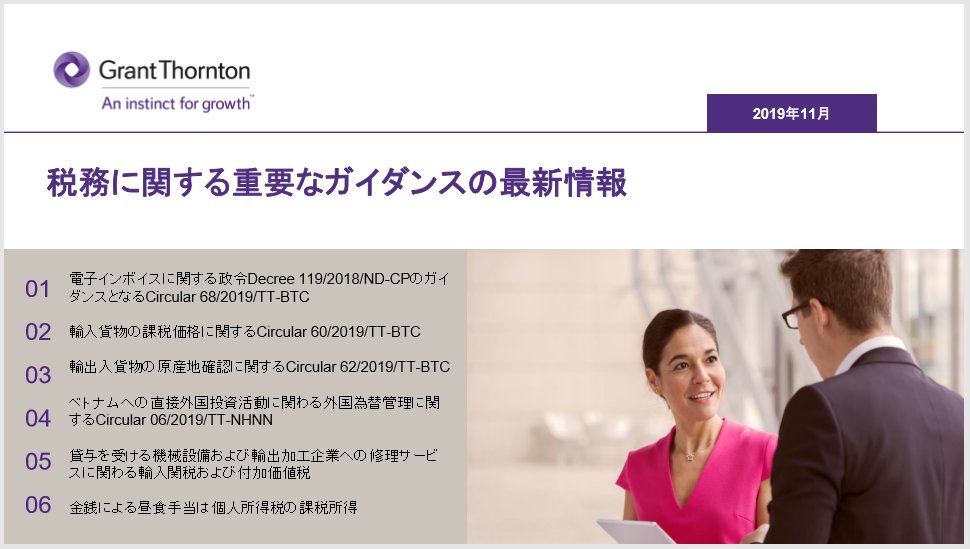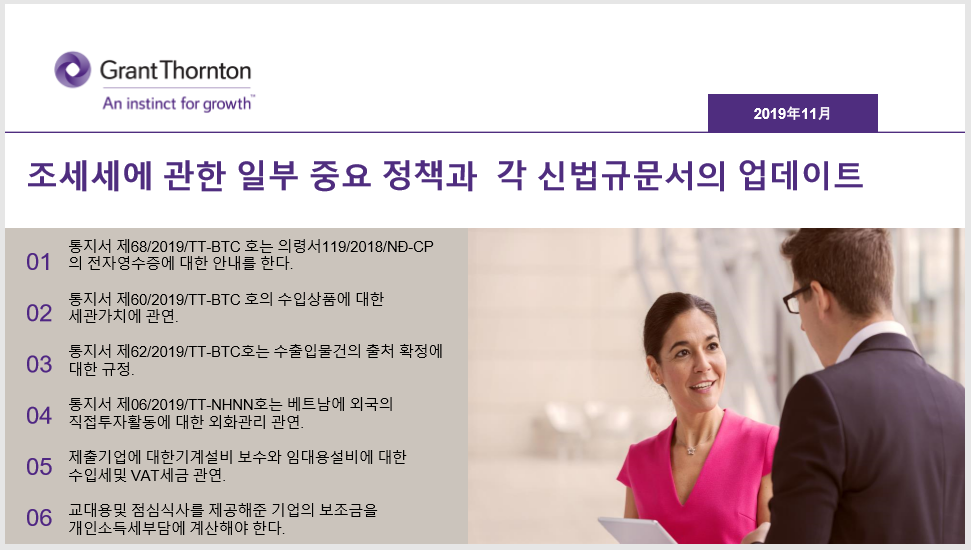-
International Financial Reporting Advisory Services
IFRS reporting advisory serivces of Grant Thornton are carried out by our dedicated team with expertise in IFRS implementation.
-
Audit Services
• Statutory audit • Review of financial statements and financial information • Agreed-upon procedures • FRAS services • Compilation of financial information • Reporting accountant • Cross-border audit • US GAAP audit
-
Audit Quality
We have various methods of monitoring our system of quality control and engagement quality, including real-time involvement of coaches and national office personnel on select audit engagements, reviews of issuer audit engagements prior to archiving by someone outside of the engagement team, and internal inspections of assurance engagements and the system of quality control.
-
Audit Approach
Audit Approach
-
Licensing services
Licensing services
-
International tax planning
Our extensive international network provides us with significant resources to meet all your expansion goals. We strive to develop commercially focused and tailored tax strategies to minimise tax exposures and maximise business efficiency.
-
Expatriate tax planning
We have a broad knowledge base and skills to assist you keep your personal income taxes to a legitimate and reasonable level, while remaining compliant with legislation. We can develop a personalised package for each key employee to take maximum advantage of the exemptions and incentives available.
-
Tax advisory
We will review the proposed business model and transactions and advise on tax implications and recommendations to optimize the tax opportunities under the local regulations and treaties which Vietnam entered into. Furthermore, we coordinate with our GT global tax team to provide a comprehensive tax advisory for the countries involved in the business model and transactions.
-
Tax compliance services
This service is designed to assist enterprises to cope with the statutory tax declaration requirements in line with the Vietnamese tax laws as well as the frequent changes and updates in tax laws.
-
Tax health check
Our Tax Health Check involves a high-level review of specific tax areas to highlight the key issues that need to be rectified in order to reduce tax risks. Through our extensive experience, we have identified key risk areas in which many enterprises are not fully compliant or often overlook potential tax planning opportunities. Our tax health check service represents a cost-effective method to proactively manage risks and reduce potential issues arising as a result of a tax inspection.
-
Transfer Pricing
Transfer pricing is a pervasive tax issue among multinational companies. In Vietnam, the tax authorities require special documentation to report related party transactions. Compliance with transfer pricing regulations is an important aspect of doing business effectively in Vietnam as failure to do so may result in significant penalties.
-
Tax due diligence
We conduct tax due diligence reviews of target companies to analyse their tax exposure and position in relation to acquisitions, mergers or consolidations. We are able to integrate this service with our Advisory Services department in order to offer a comprehensive, holistic due diligence review.
-
Customs and international trade
Our experienced professionals can help you manage customs issues more effectively through valuation planning and making use of available free trade agreements. We also assist Clients in optimising their customs procedures by making use of potential duty exemptions and efficient import-export structures. Risk mitigation activities include customs audit defense and compliance reviews.
-
M&A Transaction
We advise numerous foreign investors on efficient tax structures for their investments. Our experience allows you to consider all the options and set up a corporate structure that meets both operational and tax efficiency requirements. In short, the structure that is best for you.
-
Industrial Zones – Picking A Location For Your Business
Grant Thornton Vietnam’s one-stop services are designed to provide comprehensive support to both new and current investors who are planning to expand or restructure their business in Vietnam. Our professionals have established strong working relationships with landlords, property developers and authorities at various localities. With extensive experiences in liaison with the relevant agencies, we offer assistance including negotiation on land rental rates and efficient management of licensing process. Our customized and flexible solutions can bring benefits of cost efficient location, accelerate licensing process, and optimize tax opportunities while remaining in compliance with legislation.
-
Tax Audit Support
Tax audit support services provide comprehensive assistance to your business in Vietnam. Recent tax practices have shown the general tendency of launching routine tax audit on yearly basis. Tax authorities have been effectively using more sophisticated methods to identify target entities from across different industry sectors.
-
Business Risk Services
Business Risk Services
-
Transaction Advisory Services
Transaction Advisory Services
-
Valuation
Valuation
-
Business consulting services
Finance Management Advisory
-
Accounting services
Accounting services
-
Taxes compliance within outsourcing
Taxes compliance within outsourcing
-
Payroll, personal income tax and labor compliance
Payroll, personal income tax and labor compliance
-
Secondments/Loan staff services
Secondments/Loan staff services
-
Compilation of the financial and non-financial information
Compilation of the financial and non-financial information
-
Accounting systems review and improvement
Accounting systems review and improvement
-
Initial setting-up for accounting and taxes systems
Initial setting-up for accounting and taxes systems
-
Management accounting and analysis
Management accounting and analysis
-
Comprehensive ERP system solution
ERP software is a tool for business operations, production management, order processing and inventory in the business process. Today, ERP software for small and medium businesses has been greatly improved to help businesses manage their business better. The article below will answer all relevant information about what ERP software is and offer the most suitable ERP solution for businesses. Let's follow along!
-
Analyze Business Administration data
We believe in the value that data can bring to the success and development of every business. Our team helps design data architecture supported by tools, to support business governance and provide useful information to management.
-
Financial reporting compliance solution package
Putting financial issues at the heart, this service helps ensure that financial reports for customers comply with both the requirements of Vietnamese accounting regulations and standards (VAS) as well as reporting standards. international finance (IFRS).
-
Third-party ERP extensions
ERP is a long-term solution that requires long-term travel, not short-term. We understand that many businesses cannot deploy the entire ERP system at once due to many different reasons, instead businesses can deploy each part. Over time, these solutions can be expanded to accommodate improved business processes or can even link completely new processes across different departments.
-
Localize, deploy and rebuild the project
Quite a few ERP projects need to be implemented according to current Vietnamese requirements and regulations, but still comply with common international business requirements. These projects need some improvements and adjustments in the right direction.
-
Consulting on technology solutions
We support the selection and implementation of the most suitable solutions, ensuring business efficiency and performance. We will work closely with customers to plan, evaluate and implement the right technology investment strategies and solutions to meet the development needs of businesses.

-
Offshore company establishment service
Using the offshore company model will facilitate the owner in the process of transaction and expand overseas markets, take advantage of the tax policy with many incentives and protect the value of the family enterprise's assets.
-
Private Trust Advisory
The development of the economy with many modern financial instruments has brought many advantages and opportunities for the enterprises, but there are still certain potential risks in any type of business. So how to protect your asset value with an appropriate company structure while stay compliance with relevant regulations?
-
Our values
We have six CLEARR values that underpin our culture and are embedded in everything we do.
-
Learning & development
At Grant Thornton we believe learning and development opportunities help to unlock your potential for growth, allowing you to be at your best every day. And when you are at your best, we are the best at serving our clients
-
Global talent mobility
One of the biggest attractions of a career with Grant Thornton is the opportunity to work on cross-border projects all over the world.
-
Diversity
Diversity helps us meet the demands of a changing world. We value the fact that our people come from all walks of life and that this diversity of experience and perspective makes our organisation stronger as a result.
-
Contact us
Contact us
-
Available positions
Experienced hires
-
Available positions
Available positions
1. Circular No. 68/2019/TT-BTC guiding the implementation of Decree No. 119/2018/ND-CP on electronic invoices
On 30 September 2019, the Government officially issued Circular No. 68/2019/TT-BTC ("Circular No. 68") guiding the implementation of some articles of Decree No. 119/2018/ND-CP on electronic invoices. This circular will officially take effect from 14 November 2019. Some notable new points in this circular are as follows:
About application period and content of electronic invoices:
- From 1 November 2020, businesses, economic entities, other organizations, households and individuals doing business must register to apply electronic invoices according to the instructions in this Circular;
- The issuance date of electronic invoices is determined based on the date of seller’s electronic signature which is displayed in the format of day, month, year and in accordance with the instructions on the time of making invoice (Item e, Clause 1, Article 3)
- Names of goods and services: The names of goods and services must be shown in Vietnamese. In case of selling goods are in various categories, the goods names shall show details of each category (for example: Samsung phone, Nokia phone, etc.) (Point d.1, Clause 1, Article 3)
- Some fundamental changes in the samples, invoice symbols, the detailed characteristics, specifications of the typical goods as prescribed by law.
Issuance date of electronic invoices:
- The issuance time of e-invoices is no more than 5 days from the date that the air transport service receipt issued on the website and e-commerce system (Point d, Clause 2, Article 4);
- For real estate business, infrastructure construction, construction of houses for sale, purchase but not yet transfer of ownership or right to use: The time of making electronic invoices is the date of collecting cash or according to payment agreement in the contract. In case of ownership or right to use transfer: The time of issue e-invoices is in according to Decree No. 119 (Point c, Clause 2, Article 4);
About application of electronic invoices and handling error invoices:
- Enterprises whose equity is below VND15 billion and having one of below signs is required to use electronic invoice with tax authority code: do not have the ownership of factory, warehouse, stores; have suspicious bank transactions; earns more than 50% revenues from another enterprise whose owner is parent, spouse, sibling, or having cross ownership; fails to submit the tax declaration dossier on time; changes the address of its business location 2 times or more in 1 year (Point b, Clause 3, Article 6);
- There are 2 types of invoices with code issued each time by tax authorities: sales invoice and VAT invoice (Clause 4, Article 6).
- With error in buyer’s name and address but correct tax code, the seller shall notify the buyer of the error in the invoice and submit form No. 04 attached to Decree No. 119 to the tax authority. Other errors must be included in a report to certify errors, submit form No. 04 and make a replacement invoice (Clause 2, Article 11) for invoices with code of the tax authority.
2. Circular No. 60/2019/TT-BTC on customs valuation of imported goods
On 30 August 2019, the Ministry of Finance issued Circular No. 60/2019/TT-BTC amending and supplementing some articles of Circular No. 39/2015/TT-BTC on customs valuation of exported and imported goods. This Circular takes effect from 15 October 2019.
This Circular provides some notable new guidelines, which are mainly among the 3 groups of issues, including the General Regulations; principles and methods of determining the value of exported and imported goods; and Price database. Within the scope of this newsletter, we point out some key changes as follows:
Regarding the principles and methods of customs valuation of imported goods:
- Amend details regulations on the value situations of control and operation software, which must be added or not added to the transaction value of machinery and equipment (in which the application software value is not added to the value of intermediary device); declaration procedures for customs declarers, inspection and handling order of customs authority.
- Amendment and supplement regulations on proofs of the existence of a special relationship affects the buying and selling prices in imported goods transactions.
- Amendment and supplement regulations on copyright and license fees.
- Amendment and supplement in detail for the case that the reference price in the List of exported and imported goods posing the risk of price cannot be used to determine the customs value of goods, which is consistence with the principle of using the list of exported and imported goods posing the risk of price.
- Amendment and supplement the regulations on determination of price in some cases of specific imported and exported goods.
Regarding the price database:
- Supplement provisions on the making and usage of the List of enterprises with customs valuation risk, under which the price inspection will be carried out according to the List of exported and imported goods having risks of customs value and List of enterprises having risks of customs valuation.
3. Circular No. 62/2019/TT-BTC regulating on the determination of the origin of exported and imported goods
On 5 September 2019, the Ministry of Finance issued Circular No.62/2019/TT-BTC on amending and supplementing some articles of Circular No. 38/2018/TT-BTC of the Minister of Finance on determining the origin of exported and imported goods. This Circular takes effect from 21 October 2019.
Accordingly, this Circular adds clause for refusal of certification of goods origin as follows (Clause 3, Article 1):
- At the time of carrying out the import procedures, there are documents certifying the goods origin, but the customs declarers do not declare the reference number and the date of issue; no certificate of origin is available but the customs declarers do not declare late submission of the document on the import customs declaration as prescribed.
- In case the declarer declares late submission of documents certifying goods origin but additionally declares and submits documents passed the deadline, the customs authority rejects the documents of origin certification as prescribed.
The Circular also amends and supplements the regulations on determining the origin of exported and imported goods to apply specially incentive tax rates under the Comprehensive and Progressive Agreement for Trans-Pacific Partnership and the TransPacific Partnership (CPTPP).
4. Circular No. 06/2019/TT-NHNN on foreign exchange management for foreign direct investment activities in Vietnam
The State Bank of Vietnam has just issued Circular No.06/2019/TT-NHNN (“Circular No. 06”) on 26 June 2019, providing guidance on foreign exchange control for foreign direct investment activities in Vietnam. Accordingly, this Circular will take effect from 6 September 2019 and replace the Circular No.19/2014 /TT-NHNN dated 11 August 2014 of the State Bank.
A new point worth noting in Circular No. 06 is that compared to the current regulations, the State Bank has clarified the definition of foreign direct investment enterprises. This Circular also extends the regulations on opening direct investment accounts of foreign-invested enterprises, foreign investors participating in BCC contracts, implementing PPP projects.
In addition, Article 13 of Circular No. 06 also stipulates that an enterprise whose foreign investor has opened and used an indirect investment capital account to contribute capital, purchase shares, or contribute capital at the enterprise, resulting the foreign investor owns 51% or more of the charter capital, must open direct investment capital accounts under the provisions of this Circular.
In addition, Circular No. 06 also clarifies the general principle that foreign investors may contribute capital in foreign currencies and Vietnam Dong, according to the investor's capital contribution in the Investment registration certificate, Establishment License and operation in accordance with specialized law, Notice of satisfying the conditions for capital contribution, share purchase, acquisition of foreign investor's capital contribution, PPP contract signed with Competent state authorities and other documents proving the foreign investors' capital contribution in accordance with the provisions of law.
5. Import duties and VAT on leased machine, equipment and machinery repair services for export processing enterprises
The General Department of Customs issued Official Letter No.1966/TCHQ-TXNK dated 5 April 2019 regarding import duties and VAT for export processing enterprises.
Accordingly, in case an export processing enterprise provides a mold agreed in a processing contract with domestic enterprises for processing, the temporarily imported into Vietnam molds shall be exempt from import tax.
However, if an export processing enterprise lends molds to a domestic enterprise to produce components supplied to the company under an agreement for leased machinery and equipment, when temporarily imported into Vietnam, it is not eligible for import tax exemption.
In addition, this Official Letter also specifies the case of mold repair service provided by domestic enterprises to export processing enterprises, which is performed and consumed outside the non-tariff area (repaired at the premises of domestic enterprises), is not subject to the VAT rate of 0%.
6. Lunch allowances must be included in taxable income for PIT purpose if the company organizes shift meals and lunch meals
On 23 October 2019, the Hanoi Tax Department issued Official Letter No.80201/CT-TTHT on the PIT policy with lunch and shiftmeal. According to this official letter, if the company organizes mid-shift meals and lunches for employees in the form of meal-set purchases, this amount is not included in the employees' taxable income.
However, in addition to organizing shift meals and lunches for employees, the company also pays lunch allowance in cash for employees, this cash allowance must be included in the employees' taxable income which is subject to PIT in accordance with regulations.






